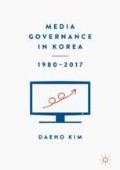Abstract
The digitization of media accelerated media convergence. The transformation to digital media and the media convergence of mobile and internet services were actively being developed around the world. The Korean government viewed the promotion of digital TV as an important national task, pursued policies on multimedia and multichannel services, and began to allow telecommunication carriers to offer broadcast services. Mobile TV and IPTV were introduced in this regard. Telecommunication companies entered the media industry. With them, media convergence resulted in more competition. In the digital TV switch-over process, civil society played a significant role, despite its worries about the competitive media environment. Civil society’s goal was to not lose the public service function of the media while recognizing that media convergence was inevitable.
Access this chapter
Tax calculation will be finalised at checkout
Purchases are for personal use only
Notes
- 1.
In 1964, 74% of colour television sets sold in the USA were made there. However, this figure fell to 67% in 1975 and to 43% in 1986. Thus, it was a well-known idea that HDTV could provide a chance for US-made receiver makers to survive in the market.
Reference I
Reference II (In Korean)
Carbonara, C.P. 1992. HDTV: An Historical Perspective. In The New TV: A Comprehensive Survey of High Definition Television, ed. L. CasaBianca. Westport: Meckler.
European Commission. 1997. Green Paper on the Convergence of the Telecommunications, Media and Information Technology Sectors, and the Implications for Regulation – Towards an Information Society Approach. Brussels: European Commission.
Foley, J. 1997. CDG Eurostudy: Digital Terrestrial Television in Europe. London: CDG Consultants Ltd.
Jenkins, H. 2006. Confronting the Challenges of Participatory Culture: Media Education for the 21st Century, White Paper for the MacArthur Foundation. Retrieved on July 1, 2008, from www.digitallearning.macfound.org.
Negroponte, N. 1995. Being Digital. New York: Alfred Knopf.
New York Times. 2014. Innovation, New York.
Broadcasting Reform Committee. 1999. Direction and Issues of Broadcasting Reform. Seoul: Korea Broadcasting Commission.
Citizen Coalition for Democratic Media. 2003. Statement: Urging Stop of Korea Broadcasting Commission’s Digital Broadcasting Transition Schedule and Reexamining Policy, August 27. Seoul: Citizen Coalition for Democratic Media.
———. 2006. IPTV Should Be Introduced as a Broadcasting Service, October 21. Seoul: Citizen Coalition for Democratic Media.
Digital Terrestrial Broadcasting Promotion Committee. 1997. Digital Terrestrial Broadcasting Transition Plan Report. Seoul: Ministry of Information and Communication.
Economic Restructuring Planning Team. 1998. D-TV: Next Generation Export Strategy Plan. Seoul: Ministry of Finance and Economy.
Electronic Times. 2005.1.10, 2005.1.14. Seoul.
Jeon, K.C. 2006. Unplanned New Media Locus. Cultural Science 45: 173–182.
Lee, W.K. 2002. Technology Policy Issues of Digital Terrestrial Broadcasting. Presented at the Conference for the Korean Association for Broadcasting and Telecommunications Studies.
Ministry of Commerce, Industry, and Energy. 1998. Management Evaluation Report. Seoul: Ministry of Commerce, Industry, and Energy.
Ministry of Finance and Economy. 1999. Digital Terrestrial TV Comprehensive Plan. Seoul: Ministry of Finance and Economy.
Ministry of Information and Communication. 1999. Management Evaluation Report. Seoul: Ministry of Information and Communication.
Author information
Authors and Affiliations
Rights and permissions
Copyright information
© 2018 The Author(s)
About this chapter
Cite this chapter
Kim, D. (2018). Age of Media Convergence. In: Media Governance in Korea 1980–2017. Palgrave Macmillan, Cham. https://doi.org/10.1007/978-3-319-70302-2_9
Download citation
DOI: https://doi.org/10.1007/978-3-319-70302-2_9
Published:
Publisher Name: Palgrave Macmillan, Cham
Print ISBN: 978-3-319-70301-5
Online ISBN: 978-3-319-70302-2
eBook Packages: Literature, Cultural and Media StudiesLiterature, Cultural and Media Studies (R0)

